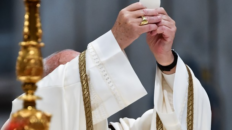5. Indulgences

Misconception: Indulgences let you pay to have your sins forgiven
First of all we need to understand what an indulgence is. The Catholic Church teaches that when a person sins, they get two punishments: eternal (hell) and temporal (punishment on earth while alive, or in purgatory after death). To remove the eternal punishment of hell, a person must confess their sins and be forgiven. But the temporal punishment remains. To remove the temporal punishment a person can receive an indulgence. This is a special “blessing” in which the temporal punishment is removed if a person performs a special act such as doing good deeds or reading certain prayers.
In the Middle ages, forgers who were working for disobedient Bishops would write fake indulgences offering the forgiveness of sins (removal of eternal punishment) in exchange for money which was often used for church building. Popes had been long trying to end the abuse but it took at least three centuries for the sale of indulgences to finally end. True indulgences existed from the beginning of Christianity and the Church continues to grant special indulgences today. Wikipedia has an excellent and honest article on the abuse of indulgences from the Middle Ages. You can read it here. Here is a BBC article on a new indulgence granted by Pope Benedict XVI in 2007.



